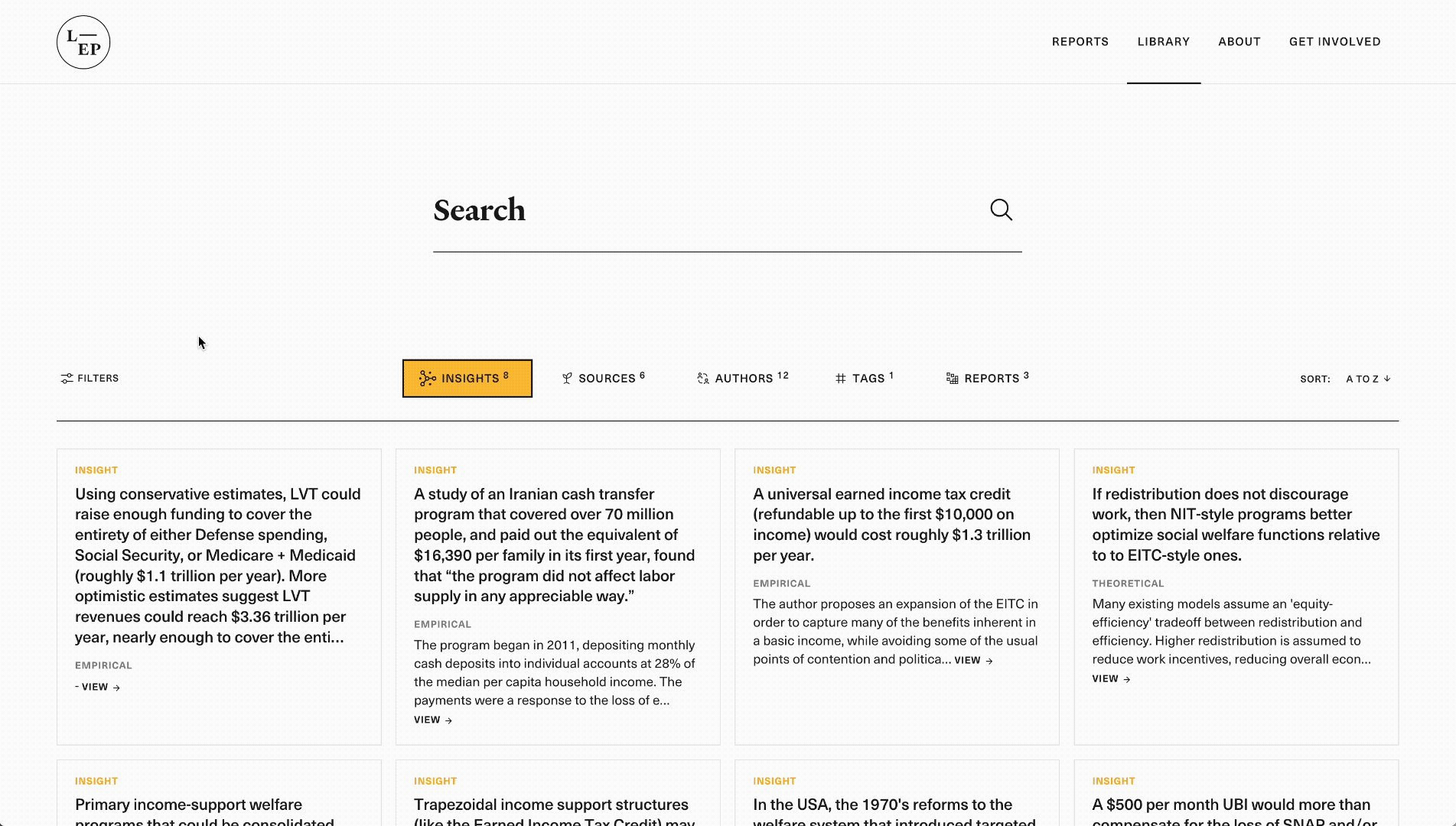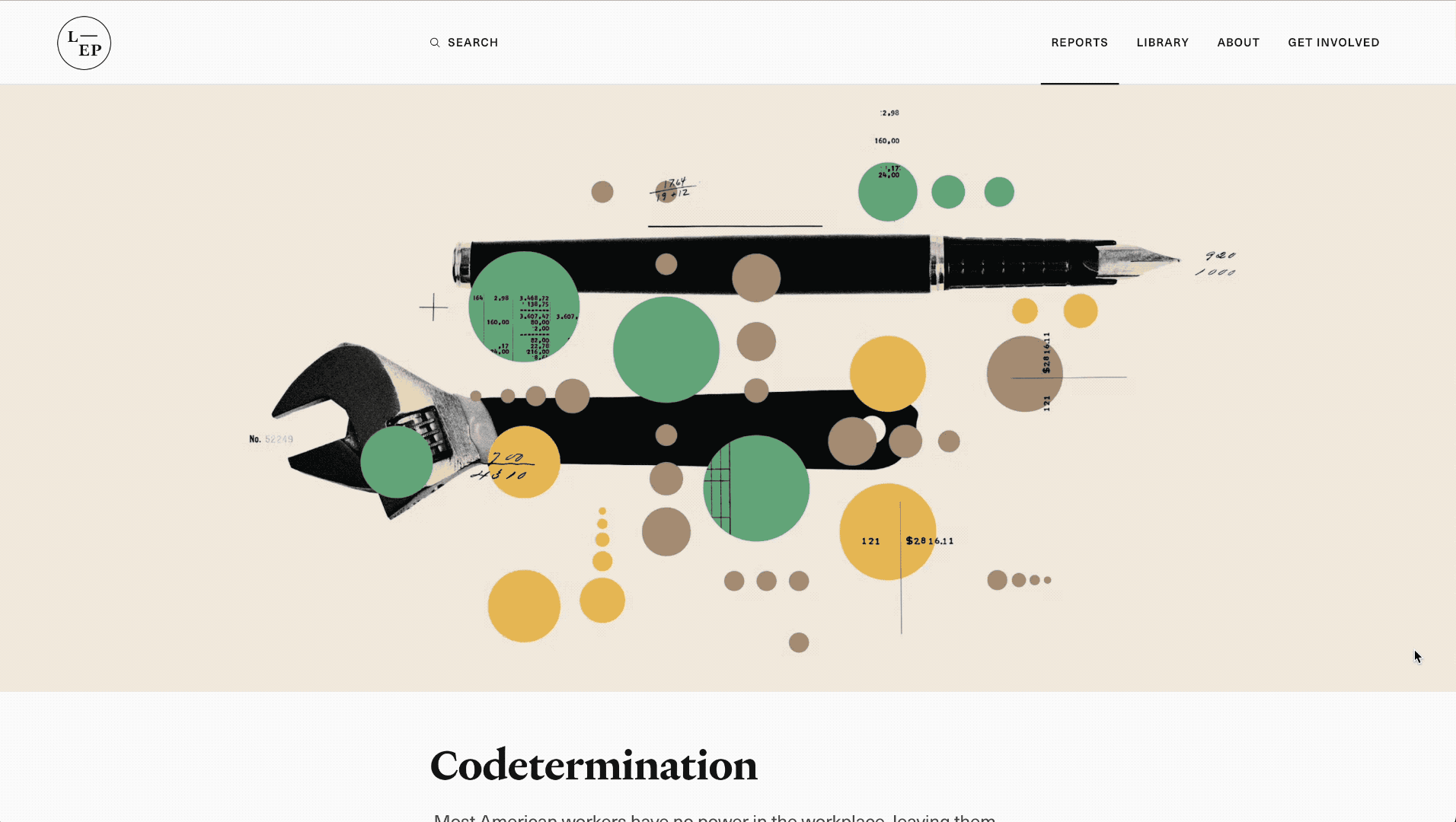Hi! We're thrilled to share the Library of Economic Possibility (LEP), a new kind of knowledge-base for discovering, organizing, and sharing economic research around high-impact policies that have remained outside the mainstream despite significant research.
Options for discovering economics research today — especially for non-specialists — are clunky. Activists tend to cherry-pick, journalists don't have the room to present a wide range of evidence in a single article, academics share their work through papers and conferences that general audiences generally don't engage with, think tanks wind up burying research beneath article archives. Search functions on major databases aren't the greatest.
This is consequential in a moment where interest is rising around new economic ideas — LEP hopes to ground this rising interest in the wealth of existing evidence, and build a bridge between general audiences and economics research. We're also trying out a new way of organizing and connecting information.
We're passionate about debating what the next economic system might look like, but we're also nerds about information architecture, and LEP's search features reflect that. Bidirectional links create associative trails between the network of information, and advanced search filters let you mix & match policies with specific areas of interest to hone in on precise relationships between information.
So if you're curious to learn more about how basic income might affect entrepreneurship, you can select the policy "basic income" and the tag "entrepreneurship," and scroll through all our insights and sources that relate to both of those filters.
Or, you could select "land value tax" and "urban development," or "codetermination" and "innovation." You get the idea.
You can find those filters on the left column:

Our policy reports also use a nifty little feature we call "insight cards." Any statistic or claim we use in a policy report is interactive, letting you pop open the card to see the source it come from, further context, the authors behind it, etc:

We have more information in our launch announcement and Twitter thread. Happy to hear any feedback or answer questions.

I’m excited to see new work in this vein, as I have long been a proponent of better research aggregation methods, however I must say I do not find the project’s superficial dismissal of neoliberalism a particularly good sign of the project’s epistemics: “Here are a few (possibly cherry-picked?) charts that show some change in trends around 1979, with no counterfactual comparison/analysis; neoliberalism must have been to blame! That’s why we need to be more rigorous and thoughtful moving forward as we analyze policy!”
Also excited about work like this, looks pretty neat! And I also find it an odd choice to make an economic analysis that's at least somewhat controversial[1] so prominent on a website that's about sharing research?
E.g. I found this recent article by Noah Smith relatively convincing that a "neoliberal turn" is probably not the most useful way to describe the recent economic history of the US.
Hey Harrison, thanks for the feedback (I'm one of the cofounders). I completely agree that our launch newsletter was a thin rebuttal of neoliberalism. We felt there's enough ink & pixels spilled on the subject; we're much more interested in the conversation around raising the profile of alternative policy options than yet another substantive critique. We do point to three works in there that we find useful in mounting a stronger critique (1, 2, 3).
That all being said, one of our main focus areas moving forward is building an interface for user contribution, so no matter our own biases or epistemics, LEP can field and provide a wider scope of information.
I'm confused as to whether the character of the project is (1) An epistemic project to make economics research more accessible and transparent or (2) A political project to promote specific areas of economic research that we believe are not accurately represented in current consensus, possibly in the hope of accelerating economic system change.
This announcement is giving me (1) vibes, whereas the newsletter is giving me (2) vibes.
Personally, I share Harrison's concerns. I think if the project is (2), these concerns are much more pressing than if the project is (1), as I expect a washout effect as more topics get added to correct for what may be biases of the founders. But based on the website, I am relatively confident that the project is (2) - the website specifies wanting to accelerate a "paradigm shift", and prominently displays a quote about the problematic nature of western capitalism.
Two give just two examples illustrating my concern with the newsletter.
I don't want to be overly critical - I am glad this project exists, and am happy to see more accessible and transparent economic data. But I want to highlight that there may be a significantly higher value if the project takes a neutral approach to economic schools and systems instead of following a line of thought or narrative that the founders (maybe correctly) take to be the right one.
Edited to reflect a closer look at the website.